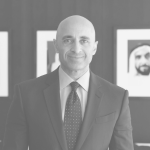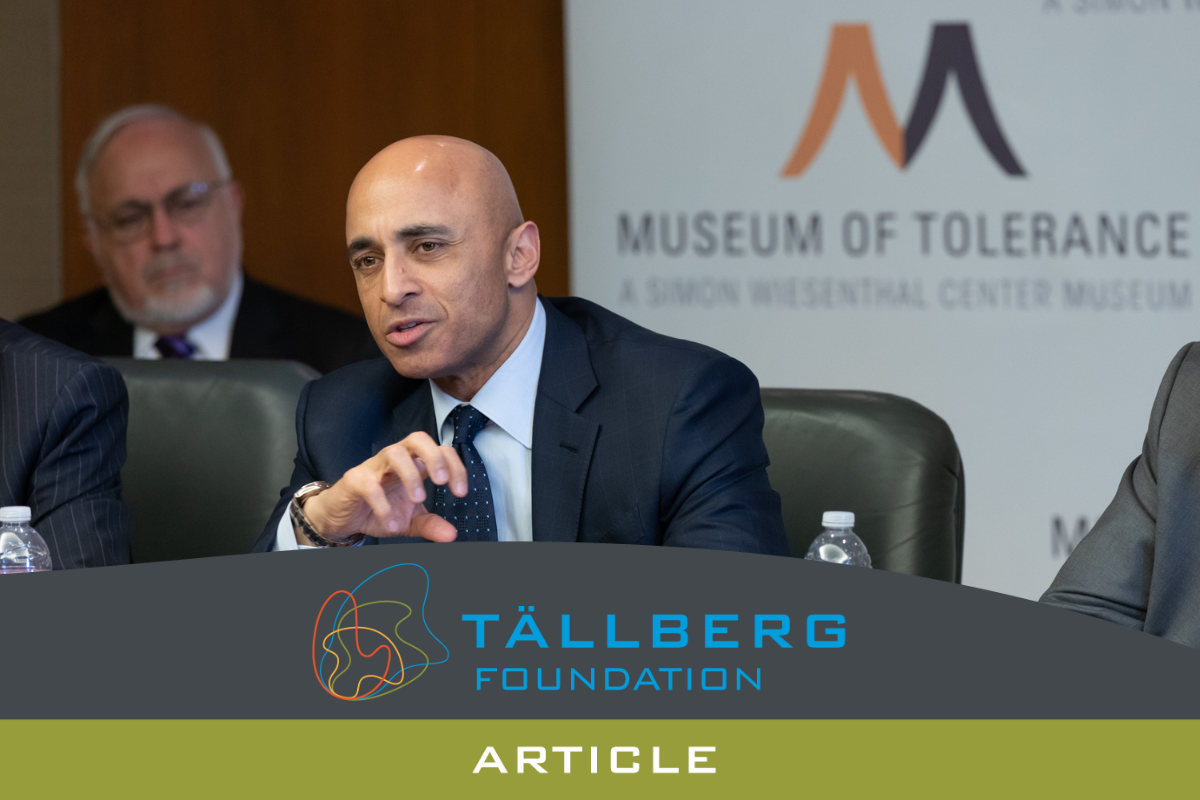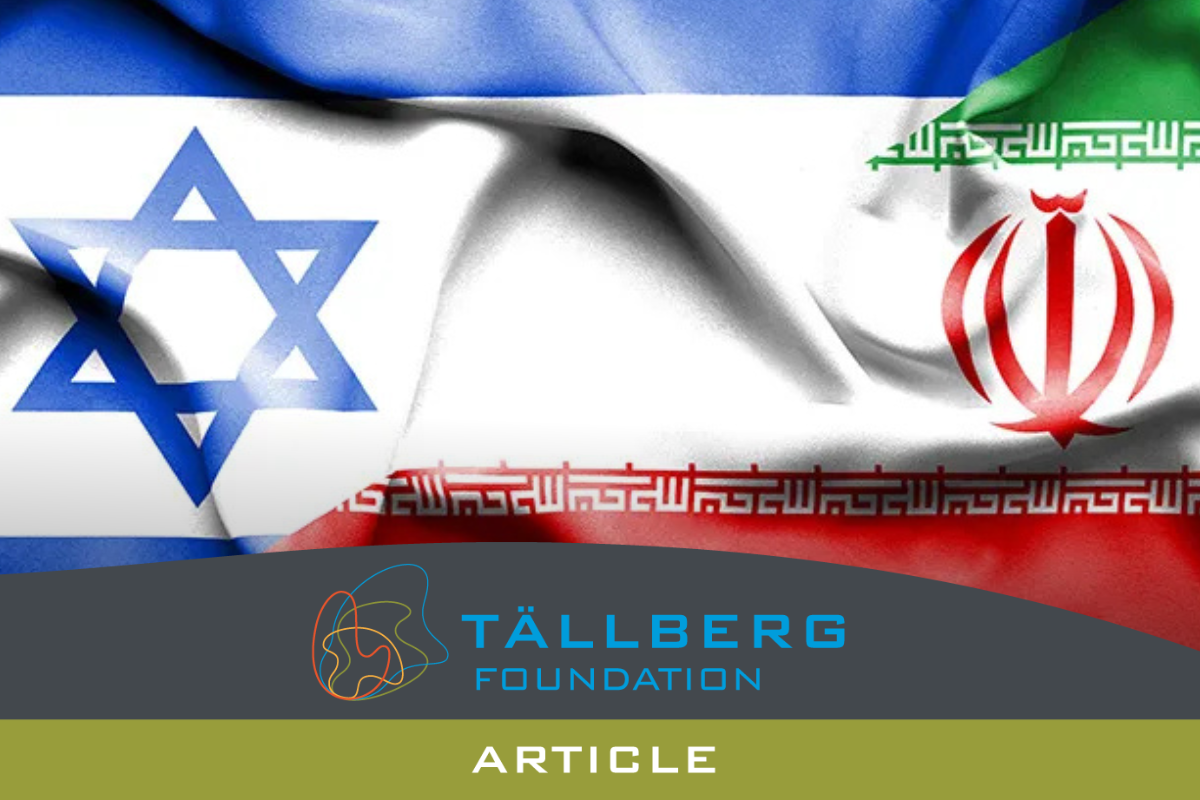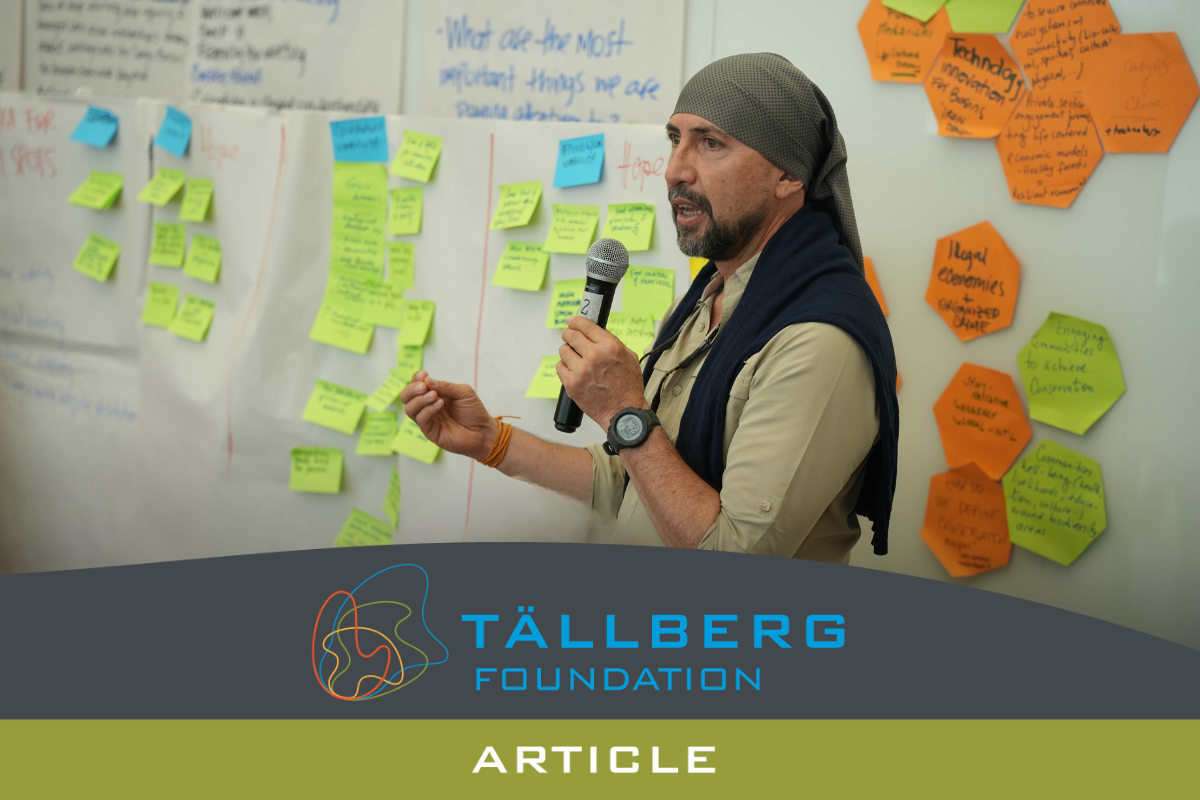“There was a moment where Israel was contemplating annexing lands in the West Bank. I thought that was going to have a drastically negative impact, not just on the region, but on Israel and on America, because America was going to have to defend an incredibly unpopular decision. So what we were trying to do was to avert what I thought would be a bad outcome.”
Ambassador Yousef Al Otaiba
Imagine a Middle East defined by economic growth, innovation, jobs and prosperity rather than war, sectarian strife, terrorism and hatred. Yousef Al Otaiba, the United Arab Emirates’ long serving Ambassador to Washington did exactly that in a recent New Thinking for a New World podcast. “What I’ve watched over the last several years is a shift in mindset, a shift in attitude; younger people are tired of conflict, they’re tired of ideology. They want solutions. They want jobs. They want what every young person around the world wants.” Indeed, he insists, “we are in the very, very early stages of re-imagining what the Middle East looks like and how it operates.”
Otaiba’s new Middle East is one that is more about economics than politics, and one that is defined by its future possibilities instead of by its past conflicts. And, as the rare diplomat who seems to believe more in actions than words, he points to what his country has been doing: “Our withdrawal from Yemen, our initiating peace with Israelis, our deescalating with a lot of the people that we often disagree with. We are trying to create a more prosperous, a more stable environment.”
The most visible element of that strategy is the Abraham Accords, the 2020 agreement among the U.A.E., Israel and the United States that was subsequently joined de facto by Bahrain, Sudan and Morocco. The opening declaration of the agreement calls for the creation of “a culture of peace among the three Abrahamic religions,” while the UAE-Israeli treaty commits both nations to “lasting peace, stability, security and prosperity.”
Otaiba insists that the intertwining of politics and economics—a departure from past regional peace efforts—is crucial to the transformative potential of the Accords. “This is about opportunities… Are we going to have better infrastructure? Are we going to have better healthcare? The Abraham Accords can help provide more research, more technology, more programs about space, agriculture, and technology.”
What about Palestine, which has dominated thinking about peace in the Middle East for at least 75 years? One of the loudest criticisms of the Abraham Accords was that the new framework abandoned long-standing Arab support for the Palestinians; that peace with Israel should have followed, not preceded a deal that gave the Palestinians a state. Otaiba is having none of it, “if the Abraham Accords had not occurred and [new Israeli] annexation had proceeded, what would the future of Palestine look like? If Israel had proceeded to annex the 10, 15, 20 or the 30% that they were asking for? What would the Palestinian situation look like? What would the two-state solution look like today in June of 2021 had annexation proceeded?”
He believes that persuading the Israelis to suspend annexation “created a win-win for everyone.” In fact, argues the Ambassador, the treaty potentially rescued the two-state solution, even if recurring fighting in Gaza and attacks on Israel suggest this is more aspirational than Otaiba would like it to be. But, he says, “If peace is going to be made, Israel is going to have to make some compromises, and the Palestinians are going to have to make some compromises.” That’s old news, but he thinks the new framework could lead to new outcomes. “We will keep pushing and helping…we can be influential, but it’s going to ultimately come back to the two parties to decide whether they want to proceed or not.”
Otaiba obviously believes that the Abraham Accords have the potential to move the region beyond the old conflict between Arab states and Israel; he also believes that the region can overcome the newer conflict between Sunni and Shia dominated countries, especially between the Arab Gulf and Iran.
Indeed, he rejects the standard religious framing. “Choosing to be religious does not mean choosing to be confrontational.” Rather, he insists, the fault line should be understood as running between “countries that spend the majority of the time thinking about future plans, versus countries that spend most of the time thinking about past history.” As a good diplomat, he refuses to put names on who is in which category, but points out that the U.A.E. “is poised to benefit from a normal relationship with Iran more than anyone else.” He enthuses about “the amount of trade, the amount of investment, the amount of cooperation, the amount of tourism that we can have with Iran, if we can find a working relationship.”
“If” is a huge qualifier, but Otaiba says “We are trying to figure out ways to work with everyone in our region for the sake of increasing the stability in the Middle East.”
Arguably, Middle East stability is in everyone’s interest. Successive U.S. presidents have justified all sorts of policies—from arms sales and foreign aid to invasions and military bases—in the name of stability. Otaiba believes that “It’s in the region’s best interest to have a much more diverse relationship with the United States on all levels, not just military and security…I want to see more engagement on climate. I want to see more engagement on culture. I want to see more engagement on economy, trade and investment.” Overall, he is looking for “more U.S. soft power” in the Middle East.
Since Otaiba is keenly aware of the on-again, off-again American debate about “withdrawing” from the Middle East, there is a whiff of making lemonade from lemons in his desire to measure U.S. engagement in ways other than “counting aircraft carriers.” At the same time, he insists he is just being realistic when he says, “It needs to be understood that there are other players in the world that will seek to replace the United States one day if the United States decides to leave.” In that context, he points to China which is already his country’s largest trading partner and largest direct investor: “It’s a country we want to work with on an economic track to make sure that the U.A.E. economy gets stronger by the day.”
The key to the kind of future Otaiba wants for his country requires a sustained shift in mindset and perception. “We’re trying to approach longstanding issues with a completely different lens… essentially going from analog to digital…on the entire scale of the country, we are really moving at a different speed, especially when it comes to the economic issues.” By way of example, he describes the Abrahamic Family House under construction in Abu Dhabi that will eventually host a synagogue, a church and a mosque. Why spend government money on such a project? “So people can understand that these three religions can actually coexist peacefully. We’re trying to send a message that this is possible, that this is feasible even in our region.”
That would certainly be a new, and much better Middle East.
Let us know what YOU think and comment below.
Ambassador Yousef Al Otaiba recently spoke with Alan Stoga as part of the Tällberg Foundation’s “New Thinking for a New World” podcast series. Hear their whole conversation here or find us on a podcast platform of your choice (Apple Podcast, Spotify, Acast, Stitcher, Libsyn, etc).
ABOUT OUR GUEST
 Yousef Al Otaiba is the Ambassador of the United Arab Emirates to the United States and Minister of State. His tenure at the U.A.E. Embassy in Washington, DC has been marked by several bilateral accomplishments in the fields of security, civil nuclear energy, health, education, culture, equal human rights and more. Among his biggest successes thus far include his involvement in the U.S.-U.A.E. 123 Agreement and the Abraham Accords normalization pact between the U.A.E. and Israel in 2020.
Yousef Al Otaiba is the Ambassador of the United Arab Emirates to the United States and Minister of State. His tenure at the U.A.E. Embassy in Washington, DC has been marked by several bilateral accomplishments in the fields of security, civil nuclear energy, health, education, culture, equal human rights and more. Among his biggest successes thus far include his involvement in the U.S.-U.A.E. 123 Agreement and the Abraham Accords normalization pact between the U.A.E. and Israel in 2020.
Ambassador Al Otaiba is a current Leadership Council Member of the Center for Public Leadership at Harvard’s Kennedy School of Government and helped introduce the Emirates Leadership Initiative in 2014. In addition, he serves on the Board of Directors for the Special Olympics, where he’s worked hard to develop new opportunities for athletes with intellectual disabilities, including the 2019 World Games in Abu Dhabi. He also serves on the Board of Trustees for the American University in Cairo and has been closely affiliated with Meridian International Center, Children’s National Medical Center and the U.A.E. Embassy’s Community Soccer Program.
He previously studied at Cairo American College, Georgetown University and the Industrial College of the Armed Forces at the National Defense University.





I am in the same point of view of His excellency Mr.Otaiba: ” People must understand that the three religions can coexist peacefully “…as all of them believe that this is God choice and must obey.